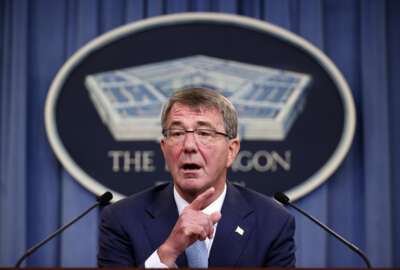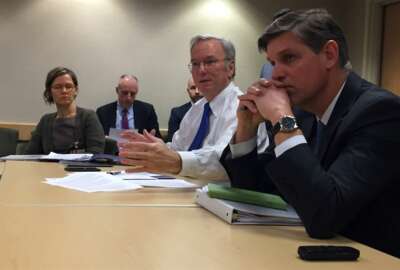
DoD chief innovation officer position put on hold
Defense Secretary Mattis is reviewing the chief innovation officer position after his predecessor moved full speed ahead on it.
The Defense Department is slowing its pace on recommendations from the Defense Innovation Advisory Board, at least for now.
The new administration seems to be taking a more cautious approach to recommendations provided by some of the tech world’s most cunning minds.
That’s in contrast to former Defense Secretary Ash Carter’s gung-ho attitude toward the board’s ideas of making DoD more efficient, effective and ready for the future.
Defense Secretary James Mattis is reviewing the board’s suggestion to create a chief innovation officer within the department.
Carter went full speed ahead with the idea last fall, ordering the establishment of the office. But Mattis wants more time to ponder it. He also wants to defer the review of the proposal to the deputy defense secretary, said Joshua Marcuse, the executive director of the Defense Innovation Board during a July 12 quarterly meeting.
That work would have to wait until the new deputy defense secretary is confirmed by the Senate and sworn in. Currently, Deputy Defense Secretary nominee Patrick Shanahan is waiting for Senate confirmation. The Senate is expected to at least vote on cloture for his nomination this evening.
Carter envisioned the innovation officer’s duties as “building software platforms and human networks to enable workforce-driven innovation across DoD at scale, sponsoring innovation contests and tournaments, and providing training and education that promotes new ideas and approaches to collaboration, creativity, and critical thinking,” Carter said last fall. “Many different organizations have recently embraced this position and also started to regularly run these kinds of innovation tournaments and competitions — including tech companies like IBM, Intel and Google — and it’s time we did as well, to help incentivize our people to come up with innovative ideas and approaches.”
Other recommendations from the board need more specificity and the department requested the board give the Pentagon more detailed suggestions.
The board wanted DoD to assess its cybersecurity vulnerabilities in its last recommendations. Mattis wants more information from the board on those issues. Meanwhile, Bob Work, who is acting as the deputy defense secretary until he is replaced, is working on a new study to better protect network vulnerabilities from cyber attacks. The study goes beyond DOD’s current approach to match industry security practices.
The board is consulting on the effort.
One area that is seeing action is the Center for Artificial Intelligence and Machine Learning. The board’s idea sets up an institute for studying those issues. Mattis directed an effort to develop a detailed plan for establishing the center.
The defense undersecretary for intelligence is also partaking in an initiative using AI to analyze and exploit data. That project will provide a prototype for how the center might be structured.
DoD started on two other initiatives while Carter was in office: increasing DoD’s recruiting of computer scientists and spending more on machine learning technologies.
Latest Defense News
For the latter initiative, Carter said the department will create a “virtual center of excellence” that lays out goals for new artificial intelligence breakthroughs and awards prize money to academic institutions and other U.S. organizations that manage to achieve them.
“Since this is an area where both the academy and commercial technology companies have been making significant strides, I’ve asked DIUx to pilot this approach by sponsoring an initial prize challenge focused on computer vision and machine learning,” he said.
Carter said the computer science hiring initiative will involve more “focus” on programs the department already has in place: they would use the Reserve Officer Training Corps and the civilian Scholarship for Service program to make computer science a “core competency” in the military, he said, and institute personnel programs that emphasize ongoing development at all stages of a professional career.
“And for the first time in a long time, DoD’s personnel and readiness office has a real, proactive agenda — a concrete action plan to guide its efforts, so that they’re doing more than just being reactive, belatedly, to issues that crop up.”
The board did not provide any updates on those initiatives.
Copyright © 2025 Federal News Network. All rights reserved. This website is not intended for users located within the European Economic Area.
Scott Maucione is a defense reporter for Federal News Network and reports on human capital, workforce and the Defense Department at-large.
Follow @smaucioneWFED






